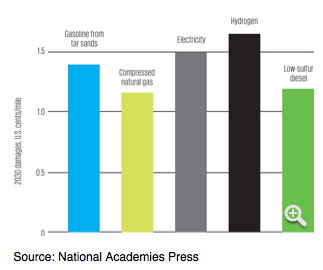Just how green are electric vehicles?
Ozzie Zehner, a visiting scholar at UC Berkeley, says it's not as clear-cut as we generally assume. In an article published in Spectrum, the news arm of the Institute for Electrical and Electronics Engineers, Zehner notes that researchers have come to some widely divergent conclusions.

Industry-funded research tends to paint a rosy picture of how electric cars, powered by clean fuels, will curb carbon emissions, Zehner writes. He cites electric vehicle research from Stanford University’s Global Climate & Energy Project, which has received $113 million from ExxonMobil, General Electric, Schlumberger, and Toyota.
Once you take into account the full life cycle of the vehicles and environmental costs in addition to carbon emissions, electric cars look a lot less green. Zehner refers to a life cycle analysis by the National Academies that considered the full environment costs of electric cars, including the manufacture and disposal of their batteries, which found no benefit compared to conventional cars.
In addition, Zehner writes, comparing electric cars to gasoline-powered cars gives short shrift to other strategies to reduce the environmental impact of transportation and land use, like transit and walkable communities, which provide additional social benefits:
There’s no doubt that gasoline- and diesel-fueled cars are expensive and dirty. Road accidents kill tens of thousands of people annually in the United States alone and injure countless more. Using these kinds of vehicles as a standard against which to judge another technology sets a remarkably low bar. Even if electric cars someday clear that bar, how will they stack up against other alternatives?
The federal government offers generous tax credits -- up to $7,500 -- to people who buy an electric vehicle. And a number of states will do you even better; West Virginia offers electric vehicle owners up to $15,000 in tax breaks, the highest in the nation. But tax credits for electric vehicles tend to be regressive, Zehner says. The average Chevy Volt owner makes $170,000 annually.
Rather than using that money to subsidize electric cars, taxpayers would get a better environmental bang for their buck with interventions like transit expansion, more targeted emissions testing policies, and making places more walkable and bikeable.




